
Epic Games, Inc. is an American video game and software developer and publisher based in Cary, North Carolina. The company was founded by Tim Sweeney as Potomac Computer Systems in 1991, originally located in his parents' house in Potomac, Maryland. Following its first commercial video game release, ZZT (1991), the company became Epic MegaGames, Inc. in early 1992 and brought on Mark Rein, who has been its vice president since. After moving the headquarters to Cary in 1999, the studio changed its name to Epic Games.

Irrational Games was an American video game developer founded in 1997 by three former employees of Looking Glass Studios: Ken Levine, Jonathan Chey, and Robert Fermier. Take-Two Interactive acquired the studio in 2006. The studio was best known for two of the games in the BioShock series, as well as System Shock 2, Freedom Force, and SWAT 4. In 2014, following the release of BioShock Infinite, Levine opted to significantly restructure the studio from around 90 to 15 employees and focus more on narrative games. In February 2017, the studio announced that it had been rebranded as Ghost Story Games and considered a fresh start from the original Irrational name, though still operating at the same business subsidiary under Take-Two.

Kenneth M. Levine is an American game developer. He is the creative director and co-founder of Ghost Story Games. He led the creation of the BioShock series, and is also known for his work on Thief: The Dark Project and System Shock 2.
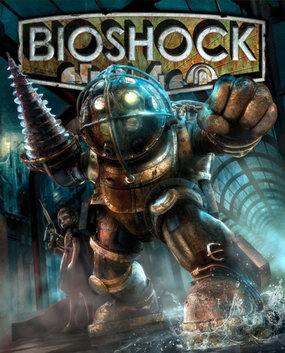
BioShock is a 2007 first-person shooter game developed by 2K Boston and 2K Australia, and published by 2K. The first game in the BioShock series, it was released for Microsoft Windows and Xbox 360 platforms in August 2007; a PlayStation 3 port by Irrational, 2K Marin, 2K Australia and Digital Extremes was released in October 2008. The game follows player character Jack, who discovers the underwater city of Rapture, built by business magnate Andrew Ryan to be an isolated utopia. The discovery of ADAM, a genetic material which grants superhuman powers, initiated the city's turbulent decline. Jack attempts to escape, fighting ADAM-obsessed enemies and Big Daddies, while engaging with the few sane people that remain and learning of Rapture's past. The player can defeat foes in several ways by using weapons, utilizing plasmids that give unique powers, and by turning Rapture's defenses against them.

Gears of War is a 2006 third-person shooter video game developed by Epic Games and published by Microsoft Game Studios. It is the first installment of the Gears of War series, and was initially released as an exclusive title for the Xbox 360 in November 2006. A Microsoft Windows version, developed in conjunction with People Can Fly, was released in November 2007. The game's main story, which can be played in single or co-operative play, focuses on a squad of troops who assist in completing a desperate, last-ditch attempt to end a war against a genocidal subterranean enemy, the Locust, and save the remaining human inhabitants of their planet Sera. The game's multiplayer mode allows up to eight players to control characters from one of the two factions in a variety of online game modes. Gameplay features players using cover and strategic fire in order to win battles.

People Can Fly is a Polish video game developer based in Warsaw. The studio was founded in February 2002 by Adrian Chmielarz, previously the co-founder of Metropolis Software, together with acquaintances Michał Kosieradzki and Andrzej Poznański. The studio's first game was Painkiller (2004). Its success led to a deal with THQ for the game Come Midnight, which allowed the studio to expand. After the game was cancelled, People Can Fly found itself in financial trouble. Epic Games acquired a majority share in People Can Fly in August 2007 and collaborated with the studio on projects such as Bulletstorm (2011) and Gears of War: Judgment (2013).

2K Australia Pty Ltd was an Australian video game developer based in Canberra. The company was founded as Irrational Games Australia, a subsidiary of Irrational Games, in April 2000. Irrational Games Australia and its parent were acquired by Take-Two Interactive in January 2006, with Irrational Games being placed under the 2K label. The two Irrational Games studio were split apart in August 2007, wherefore Irrational Games Australia became 2K Australia. Furthermore, 2K Australia under the name of sister studios 2K Marin between April 2010 and November 2011, and was finally shut down in April 2015.

BioShock 2 is a first-person shooter video game developed by 2K Marin and published by 2K Games. It was released worldwide for PlayStation 3, Windows, and Xbox 360 on February 9, 2010; Feral Interactive released an OS X version on March 30, 2012. The game takes place in the dystopian underwater city of Rapture, eight years after the events of BioShock. In the single-player campaign, players control the armored protagonist Subject Delta as he fights through Splicers—the psychotic human population of the city—using weapons and an array of genetic modifications. The game includes a story-driven multiplayer mode that takes place before the events of BioShock, during Rapture's civil war.

2K Marin, Inc. was an American video game developer based in Novato, California. Founded in December 2007 as a spin-off from their parent, 2K, the company developed BioShock 2 (2010) and The Bureau: XCOM Declassified (2013) before laying off or relocating all staff in October 2013 and silently being closed.

BioShock is a retrofuturistic video game series created by Ken Levine, published by 2K and developed by several studios, including Irrational Games and 2K Marin. The BioShock games combine first-person shooter and role-playing elements, giving the player freedom for how to approach combat and other situations, and are considered part of the immersive sim genre. Additionally, the series is notable for exploring philosophical and moral concepts with a strong in-game narrative influenced by concepts such as Objectivism, total utilitarianism, and American exceptionalism.

Augustus Sinclair is a fictional character in the 2K 2010 video game BioShock 2. Within the game, he was one of the leading figures in Rapture's genetics industry and an important businessman. Described as an example of moral relativism, Sinclair plays a significant role in BioShock 2, guiding the player to Eleanor Lamb. He speaks with a characteristic Tidewater accent, voiced by Doug Boyd.
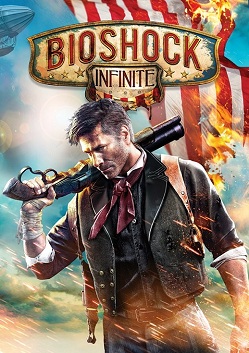
BioShock Infinite is a first-person shooter video game in the BioShock series, developed by Irrational Games and published by 2K. Infinite was released worldwide for the PlayStation 3, Windows, Xbox 360, and OS X platforms in 2013. The game is set in the year 1912 and follows its protagonist, Booker DeWitt, who is sent to the airborne city Columbia to retrieve Elizabeth, a young woman held captive there. Booker and Elizabeth become involved in a class war between the nativist Founders that rule Columbia and the rebel Vox Populi, representing the city's underclass. Elizabeth possesses the ability to manipulate "Tears" in the space-time continuum, and Booker and Elizabeth discover she is central to Columbia's dark secrets. The player controls Booker DeWitt throughout the game, fighting enemies and scavenging supplies, while the computer-controlled Elizabeth provides assistance.
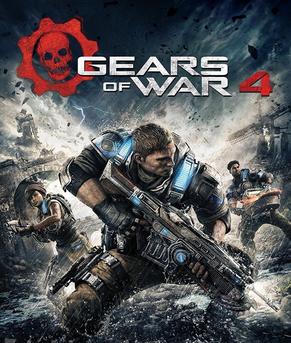
Gears of War 4 is a 2016 third-person shooter video game developed by The Coalition and published by Microsoft Studios for Windows and Xbox One. It is the fourth main installment in the Gears of War series, and the first mainline entry not to be developed by Epic Games. The game was released worldwide on October 11, 2016. The sequel, Gears 5, was released on September 10, 2019.
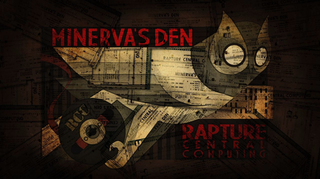
BioShock 2: Minerva's Den is a single-player downloadable content (DLC) campaign for the 2010 first-person shooter game BioShock 2, developed by 2K Marin and published by 2K Games. The player assumes the role of Subject Sigma, an armored and genetically modified human, or "Big Daddy"; Sigma must travel through Minerva's Den, the technological hub of the underwater city of Rapture, to download a schematic of the city's supercomputer. Gameplay is similar to that of BioShock 2, with new enemies and weapons.

The Coalition is a Canadian video game developer and a studio of Xbox Game Studios based in Vancouver. The Coalition is best known for developing games in the Gears of War series after the franchise's acquisition by Xbox Game Studios from Epic Games.

The development of BioShock Infinite began after BioShock's release in August 2007. The five-year development, led by studio Irrational Games, began under the moniker "Project Icarus". Irrational's creative lead, Ken Levine was inspired by events at the turn of the 20th century and the expansion of the concept of American Exceptionalism set by the 1893 World's Fair in Chicago. His story took these events to create a tale set in 1912 where the player, as former Pinkerton agent Booker DeWitt, is challenged to rescue a young woman, Elizabeth, who has been kept aboard the floating city of Columbia in the middle of a civil war between its founder Father Zachary Comstock and the Vox Populi, the underclass revolting against him.
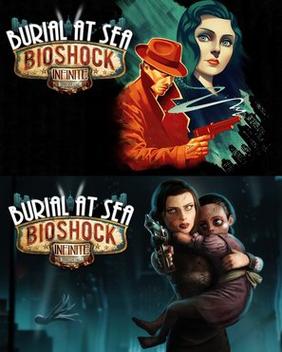
BioShock Infinite: Burial at Sea is a two-part single-player expansion to the first-person shooter video game BioShock Infinite. It was developed by Irrational Games and published by 2K Games for PlayStation 3, OS X, Windows, Xbox 360, and Linux platforms. Episode One was released digitally on November 12, 2013, followed by Episode Two on March 25, 2014. A retail version was released as part of BioShock Infinite: The Complete Edition, and later included in BioShock: The Collection for PlayStation 4, Xbox One, and Nintendo Switch.

BioShock: The Collection is a compilation of the BioShock video games, developed by Blind Squirrel Games and published by 2K Games. The Collection features upgraded versions of BioShock, BioShock 2, and BioShock Infinite, with new textures and support for higher resolution displays and framerates. The compilation was released in September 2016 for PlayStation 4, Xbox One, and Windows; versions for macOS and Nintendo Switch followed in August 2017 and May 2020, respectively.

Perception is a first-person horror-themed adventure video game developed by The Deep End Games and published by The Deep End Games and Feardemic. It was released for Microsoft Windows on May 30, 2017, followed by the PlayStation 4 and Xbox One versions on June 6, and by the Nintendo Switch version on October 31. The story follows Cassie Thornton, a blind woman who perceives the world using echolocation. The player assumes the role of Cassie and must use her unique skill to explore a large mansion in Gloucester, Massachusetts and uncover its secrets.

Ghost Story Games, LLC is an American video game developer based in Westwood, Massachusetts, and led by Ken Levine. The studio is the rebranding of Irrational Games as announced in February 2017, and while still the same business subsidiary under Take-Two Interactive, the rebranding was considered a fresh start by the founders as they move into more emergent narrative-driven titles compared to the larger titles they had made under Irrational.



















